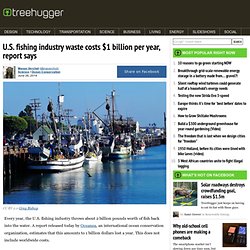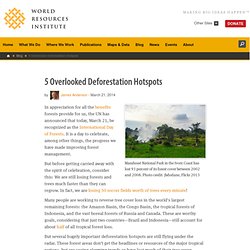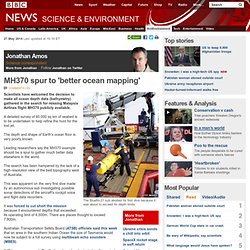

US politics. Why the United States Leaves Deadly Chemicals on the Market. (Photo: Toxic Chemical Dump via Shutterstock)

Big Oil Can't Go On Like This. Ensuring that our planet remains hospitable requires leaving about three-quarters of all oil, gas, and coal deposits underground or beneath the sea floor.

Journey to Ecuador’s Secret Oil Road. Assurances by Secretary Fabara that the methods employed by PetroAmazonas in the sensitive area are "being monitored by everybody" were rebutted by Professor Massimo De Marchi, an expert in sustainable development and environmental science and one of the authors of the 2014 report.

De Marchi said that independent on-the-ground checks in Yasuní are almost impossible due to the remoteness of the forest and the "typical military and private security activities" that surround oil operations. Environment/Nature. Pushing for transparency in Congo Basin palm oil. The global palm oil industry is at a critical juncture.

In 2012 we published a report that outlined how Africa is a new frontier for industrial palm oil production. This may bring much needed development to the continent, but it could also just as easily come at a great social and environmental cost. The expansion of palm oil production is one of the fastest growing drivers of deforestation in the tropics, emitting tons of greenhouse gases as a result. It too often leads to conflict with local communities over rights and access to land and forest resources, upon which they are highly dependent. This Is How You Can Get People To Make Better Decisions For Future Generations. Albert Einstein once said: “Nothing truly valuable can be achieved except by the unselfish cooperation of many individuals.

" Alas, when it comes to joining together to conserve Earth's resources and protect our planet for future generations, we humans have proven to be a decidedly uncooperative lot. "There has been a great deal of work on how people cooperate with those they see every day –- their colleagues or friends," Dr. Martin Nowak, professor of mathematics and biology at Harvard University, said in a written statement.
Our Oceans Are Dying: Mobilizing an Indifferent Public to Confront This Crisis I did not expect good news when I attended the reception at the Museum of Natural History on June 25th to learn about the results of the Global Ocean Commission report on the state of the world's oceans.

These days, reports from environmental groups are never something to cheer about. U.S. fishing industry waste costs $1 billion per year, report says. Every year, the U.S. fishing industry throws about 2 billion pounds worth of fish back into the water.

A report released today by Oceanea, an international ocean conservation organization, estimates that this amounts to 1 billion dollars lost a year. This does not include worldwide costs. For an industry that represents 82 billion dollars in the U.S. economy, this is a big problem. Currently, the fishing industry offers 1.2 million jobs, but the money lost through bycatch could mean as much as 60,000 fewer jobs per year. “We’re really hoping that this project in particular brings economics a little bit more into the discussion about making fishery management decisions,” Amanda Keledjian, a marine scientist and co-author of the report, told TreeHugger.
And the numbers, though a conservative estimate, are staggering. Fishermen throw away their unwanted bycatch for multiple reasons. U.S. Tasmanian forest ruling: Abbott government says jobs will be lost. Tribes & campaigns. 5 Overlooked Deforestation Hotspots. In appreciation for all the benefits forests provide for us, the UN has announced that today, March 21, be recognized as the International Day of Forests.

It is a day to celebrate, among other things, the progress we have made improving forest management. But before getting carried away with the spirit of celebration, consider this: We are still losing forests and trees much faster than they can regrow. MH370 spur to 'better ocean mapping' 27 May 2014Last updated at 10:10 ET The Bluefin-21 sub aborted its first dive because it was about to exceed its depth limits.

Marine wildlife: All about turtles on World Turtle Day. Speakers stress the importance of helping the animals survive.

WWF-Pakistan held a seminar to mark World Turtle Day on Friday. Experts showed presentations on turtles’ life cycle. Human Impact on Amazon Rainforest Grossly Underestimated. May 23, 2014 04:47 PM EDT Human impact on the Amazon rainforest has been grossly underestimated, according to an international team of researchers. The report detailed in the journal Global Change Biology says that selective logging and surface wildfires can amount to an annual loss of 54 billion tons of carbon from the Brazilian Amazon - that's equivalent to 40 percent of the yearly carbon loss from deforestation. Researchers estimated both above and below-ground carbon loss from selective logging and ground level forest fires in the tropics using data from 70,000 sampled trees and thousands of soil, litter and dead wood samples from 225 sites in the eastern Amazon. Deforestation leads to such large amounts of carbon loss - which in turn increases greenhouse gas emissions - starting with logging of prized trees such as mahogany and ipe.
The removal of these trees impacts and damages neighboring trees. Co-author Dr.